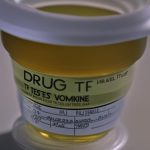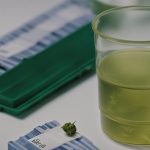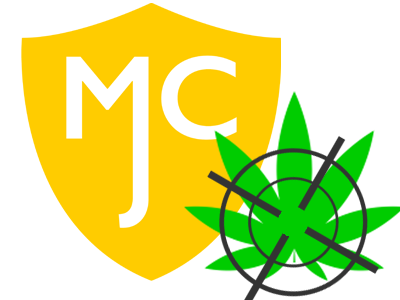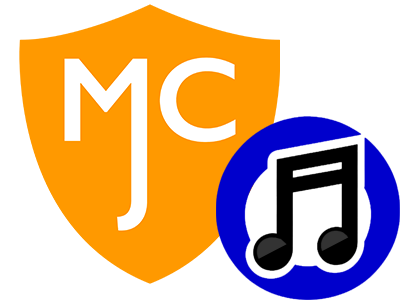
We all know how important it is to stay healthy and maintain an active lifestyle. But did you know that exercise can actually impact the results of a urine drug test? In particular, when it comes to detecting cannabis and its main psychoactive component, tetrahydrocannabinol (THC), exercise plays a significant role.
Understanding the impact of exercise on THC breakdown and detoxification is crucial, especially for individuals who need to pass a drug test. In this article, we will explore the relationship between exercise and urine drug test results, the process of detoxification and THC metabolism, and the factors that can affect the accuracy of drug screening programs.
Key Takeaways:
- Exercise can influence the results of a urine drug test, particularly in relation to cannabis detection.
- THC is stored in fat cells and gradually released into the bloodstream.
- Exercise promotes the release of THC from fat cells and can aid in detoxification.
- Hydration, exercise, and a healthy diet can potentially increase the chances of passing a drug test.
- Consulting professionals is important for personalized guidance and advice.
Detoxification and THC Metabolism
Detoxification is a vital process in the elimination of THC from the body. When cannabis is consumed, THC is stored in fat cells and gradually released into the bloodstream. This process occurs as the body metabolizes THC into THC metabolites, which are then excreted in urine. Understanding the intricacies of THC metabolism and detoxification is key to comprehending the impact of exercise on urine drug test results.
During THC metabolism, several factors influence the rate at which THC is broken down. These factors include body weight, metabolism, the dosage of cannabis consumed, and the frequency of use. For individuals with higher body fat percentages, THC can be stored for longer durations, leading to a slower detoxification process. Additionally, heavy cannabis users may accumulate higher levels of THC in their fat cells due to increased exposure over time.
It is important to note that detoxification is a complex process influenced by various individual factors. While exercise can promote the breakdown of fat cells and release THC metabolites into the bloodstream, it may not completely eliminate THC or significantly accelerate the detoxification process. Furthermore, the effectiveness of exercise in detoxification can vary based on an individual’s unique physiological characteristics and the amount of THC stored in their fat cells.
| Factors | Impact on THC Metabolism and Detoxification |
|---|---|
| Body weight | Higher body weight may lead to prolonged storage of THC in fat cells, resulting in a slower detoxification process. |
| Metabolism | Individuals with faster metabolisms may experience quicker THC breakdown and elimination. |
| Dosage of cannabis consumed | Higher cannabis dosages can lead to increased THC levels in fat cells and a potentially longer detoxification process. |
| Frequency of use | Regular cannabis users may accumulate higher levels of THC in fat cells, leading to a more prolonged detoxification process. |
Understanding the detoxification process and its relationship to THC metabolism is crucial in navigating the complexities of urine drug testing. While exercise can play a role in promoting the release of THC metabolites, it is essential to consider other factors such as individual metabolism, body fat percentage, and the frequency of cannabis use when evaluating the potential impact of exercise on drug test results.
The Role of Exercise in Detoxification
Exercise plays a vital role in the detoxification process by promoting the release of THC from fat cells. Physical activity increases metabolism and the breakdown of fat, leading to the release of stored THC metabolites into the bloodstream. This, in turn, can expedite the elimination of THC from the body. However, it’s important to note that exercise alone may not completely eliminate THC and may even temporarily increase THC levels in the bloodstream.
When we engage in exercise, the body’s energy demands increase, prompting it to tap into stored fat reserves for fuel. As THC is stored in fat cells, this process can result in the release of THC metabolites into the bloodstream, making them more accessible for elimination. Additionally, exercise stimulates the lymphatic system, which aids in the removal of waste products, including THC metabolites, from the body.
However, it’s crucial to recognize that exercise alone cannot guarantee a negative drug test result. The rate at which THC is released and eliminated from fat cells can vary depending on factors such as individual metabolism, body fat percentage, and the frequency and intensity of physical activity. It’s also important to note that high-intensity exercise can temporarily increase THC levels in the bloodstream due to the release of stored metabolites.

Potential Benefits of Exercise in Detoxification:
- Facilitates the release of THC from fat cells
- Increases metabolism and fat breakdown
- Stimulates the lymphatic system for waste removal
Considerations when using exercise for detoxification:
- Individual factors can impact the rate of THC elimination
- Exercise intensity can temporarily increase THC levels in the bloodstream
- Exercise alone may not completely eliminate THC
In summary, exercise can play a significant role in the detoxification process by promoting the release of THC from fat cells. However, it should be used in conjunction with other detoxification strategies and considering individual factors. Regular exercise, combined with a healthy diet and hydration, can enhance the body’s natural detoxification process and increase the chances of passing a urine drug test.
Exercise and Urine Drug Testing
Exercise can have an impact on urine drug testing, but the specific effects vary depending on the testing protocols and cutoff levels used. While exercise has the potential to increase THC levels in the short term and potentially lead to a positive drug test result, regular exercise combined with hydration can aid in the subsequent elimination of THC from the body. It’s important to note, however, that exercise and food deprivation are unlikely to cause significant changes in cannabinoid levels that would affect the accuracy of drug testing programs.
To better understand the relationship between exercise and urine drug testing, let’s take a closer look at the detection of THC in the body. When cannabis is consumed, THC is stored in fat cells and released into the bloodstream over time. Exercise promotes the breakdown of fat, leading to the release of stored THC metabolites into the bloodstream. While this can expedite the elimination of THC, it may also temporarily increase THC levels in the body. The timing and intensity of exercise can play a role in the impact on drug test results.
To illustrate the potential impact of exercise on urine drug testing, let’s consider the following hypothetical example:
| Testing Protocol | Cutoff Level | Exercise | Drug Test Result |
|---|---|---|---|
| Standard | 50 ng/mL | No exercise | Negative |
| Standard | 50 ng/mL | Intense exercise 24 hours prior to test | Positive |
| Expanded | 20 ng/mL | Intense exercise 24 hours prior to test | Negative |
In the example above, intense exercise 24 hours before the drug test resulted in a positive result when the standard cutoff level of 50 ng/mL was used. However, with an expanded testing protocol and a lower cutoff level of 20 ng/mL, the same exercise regimen resulted in a negative drug test.
It’s important to note that individual factors, such as metabolism, body composition, and the amount of THC stored in fat cells, can also influence the impact of exercise on drug test results. To ensure the most accurate interpretation of drug test results, consulting professionals and understanding the specific testing protocols are crucial.
Factors Affecting Detoxification and Drug Test Results
When it comes to detoxification and passing a drug test, several factors come into play that can affect the results. Understanding these factors is crucial for individuals who are seeking to pass a urine drug test. Here, we will explore the key factors that can influence the detoxification process and the interpretation of drug test results.
Metabolism
One of the primary factors affecting detoxification is an individual’s metabolism. Metabolism refers to the rate at which the body processes and eliminates substances, including drugs. People with a faster metabolism tend to eliminate drugs from their system more quickly, while those with a slower metabolism may take longer to detoxify. Therefore, individuals with a slower metabolism may have a higher chance of testing positive for drugs in a urine test.
Body Fat Percentage
Another important factor is an individual’s body fat percentage. THC, the psychoactive component of cannabis, is stored in fat cells. This means that individuals with a higher body fat percentage may have a longer detection window for THC in their system. Conversely, individuals with a lower body fat percentage may eliminate THC more quickly.
Frequency of Use
The frequency of cannabis use can also impact the detoxification process and drug test results. Chronic and heavy cannabis users may have a higher amount of THC stored in their fat cells, leading to a longer detection window. On the other hand, occasional or infrequent users may eliminate THC more rapidly.
| Factors Affecting Detoxification and Drug Test Results | Description |
|---|---|
| Metabolism | The rate at which the body processes and eliminates drugs. |
| Body Fat Percentage | The amount of fat in the body, which can impact THC storage and elimination. |
| Frequency of Use | The regularity and amount of cannabis use, affecting THC accumulation in the body. |
It is important to note that these factors can interact with one another, further complicating the detoxification process. For example, an individual with a slow metabolism and high body fat percentage who frequently uses cannabis may have a longer detection window compared to someone with a fast metabolism, low body fat percentage, and infrequent cannabis use.
Overall, these factors highlight the complex nature of detoxification and drug test results. They demonstrate the need for individuals to consider their unique circumstances when preparing for a drug test and seeking to pass it successfully. By understanding the interplay of metabolism, body fat percentage, and frequency of cannabis use, individuals can make informed decisions regarding detoxification methods and increase their chances of passing a urine drug test successfully.
Strategies for Detoxification and Passing a Drug Test
When it comes to detoxification and passing a drug test, there are several strategies that can potentially increase your chances of success. These strategies involve a combination of hydration, exercise, and diet, which can help expedite the elimination of THC from your body.
Hydration: Staying well-hydrated is crucial for flushing out toxins, including THC metabolites, from your system. Drinking plenty of water throughout the day can help dilute your urine and increase the frequency of urination, aiding in the elimination of THC. Additionally, consuming natural diuretics like cranberry juice or green tea can further promote the detoxification process.
Exercise: Engaging in regular physical activity is an effective way to promote the release of THC from your fat cells. Exercise increases metabolism and fat breakdown, leading to the release of stored THC metabolites into the bloodstream. This can help expedite their elimination through urine. However, it’s important to note that intense exercise immediately before a drug test may temporarily increase THC levels in the bloodstream. Therefore, it’s advisable to exercise regularly in the weeks leading up to the test for optimal results.
Diet: Maintaining a healthy diet is also essential for detoxification. Incorporating foods high in fiber, such as fruits, vegetables, and whole grains, can help improve digestion and promote bowel movements, aiding in the elimination of toxins. Avoiding high-fat foods is recommended, as THC is stored in fat cells and consuming fatty foods can prolong the elimination process. Focus on consuming a balanced diet that includes lean proteins, complex carbohydrates, and essential vitamins and minerals.
Summary
Combining hydration, exercise, and a balanced diet can potentially increase your chances of passing a drug test. Staying well-hydrated helps flush out toxins, while regular exercise promotes the release of THC from fat cells. A healthy diet improves digestion and bowel movements, aiding in the elimination of THC. However, it’s important to note that these strategies are not foolproof and their effectiveness can vary depending on individual factors and the specific drug testing protocols. Consulting professionals who specialize in drug testing can provide valuable guidance tailored to your specific circumstances.
| Detoxification Strategies | Benefits | Considerations |
|---|---|---|
| Hydration | – Flushes out toxins – Increases frequency of urination | – May result in diluted urine – Requires frequent bathroom trips |
| Exercise | – Promotes release of THC from fat cells – Increases metabolism | – Intense exercise before test may temporarily increase THC levels – Results may vary depending on individual factors |
| Diet | – Improves digestion and bowel movements – Provides essential nutrients for detoxification | – High-fat foods can prolong THC elimination – Results may vary depending on individual factors |

“Staying well-hydrated, engaging in regular exercise, and maintaining a healthy diet are key strategies for detoxification and improving your chances of passing a drug test.” – Drug Testing Expert
Potential Limitations and Considerations
When it comes to detoxification methods and their impact on drug test accuracy, there are several important limitations and considerations to keep in mind. While exercise and other detox strategies can aid in the elimination of THC, it is crucial to understand that complete elimination within a short period is not guaranteed.
The accuracy of drug test results can be influenced by various factors such as the sensitivity of the test, individual metabolism, and the amount of THC stored in fat cells. These factors can differ from person to person, making it difficult to predict how long it will take for THC to be completely eliminated from the body.
In addition, it is essential to consider the timing of the drug test in relation to the last cannabis consumption and detoxification efforts. THC and its metabolites can remain detectable in urine for days to weeks, depending on factors like frequency of use and body fat percentage. Detoxification methods, including exercise, may expedite the elimination process, but they cannot guarantee immediate results.
Factors Affecting Drug Test Accuracy
To better understand the limitations and considerations surrounding detoxification and drug test accuracy, let’s explore some of the key factors that can affect the results:
- Individual Metabolism: Each person’s metabolism is unique, and the rate at which THC is broken down and eliminated from the body can vary. Some individuals may naturally have a faster metabolism, leading to quicker detoxification.
- Amount of THC Stored in Fat Cells: THC is stored in fat cells, and individuals with higher body fat percentages may store more THC. This can result in a more prolonged elimination process as THC is gradually released into the bloodstream.
- Frequency of Cannabis Use: Regular cannabis use can lead to THC accumulation in the body over time. The more frequently cannabis is consumed, the longer it may take for THC to be fully eliminated.
- Timing of Detoxification Efforts: Detoxification efforts should be timed appropriately to optimize the chances of passing a drug test. It’s important to consider the time needed for THC to be completely eliminated from the body, as well as the time required for detoxification methods to take effect.
Understanding these factors and their potential impact on drug test accuracy is crucial for individuals seeking to pass a urine drug test. While detoxification methods, including exercise, can aid in the elimination of THC, they should be approached with realistic expectations and in consultation with professionals who can provide personalized guidance.

The Importance of Consulting Professionals
When it comes to preparing for a drug test and considering detoxification methods, consulting professionals is of utmost importance. We understand that passing a drug test can be a high-stakes situation, and it’s essential to have guidance and advice tailored to your individual circumstances. By seeking the expertise of medical professionals, substance abuse counselors, and experts in drug testing, you can gain valuable insights that can significantly impact your detoxification journey.
Drug testing professionals can provide you with up-to-date information on the latest testing protocols, cutoff levels, and detection windows for different substances. This knowledge is crucial in determining the most effective detoxification strategies and understanding the accuracy of drug test results. They can help you navigate through the complexities of detoxification, taking into account factors such as your metabolism, body fat percentage, frequency of use, and the specific drug tests you may encounter.
“Seeking professional guidance can help you make informed decisions and increase your chances of achieving the desired outcome.”
Detoxification advice provided by professionals can offer a comprehensive approach to your drug test preparation. They can provide recommendations on hydration techniques, exercise routines, and dietary adjustments that can aid in the elimination of toxins from your body. Additionally, they can assess the potential risks and benefits of various detoxification methods, ensuring your safety and well-being throughout the process.
Table: Benefits of Consulting Professionals for Detoxification
| Benefits | Explanation |
|---|---|
| Expertise | Professionals possess specialized knowledge and experience in drug testing and detoxification, allowing them to provide accurate and reliable advice. |
| Personalized Guidance | They can tailor detoxification strategies to your unique circumstances, taking into account individual factors that may affect drug test results. |
| Up-to-Date Information | Professionals stay informed about the latest developments in drug testing protocols, ensuring you have the most relevant and current information. |
| Risk Assessment | They can assess the potential risks and benefits associated with different detoxification methods, helping you make informed decisions for your health and well-being. |
| Support | Consulting professionals provides emotional support and encouragement throughout your detoxification journey, helping you stay motivated and focused on your goal. |
Remember, passing a drug test and achieving detoxification require careful planning and consideration. By consulting professionals who specialize in drug testing and detoxification, you can obtain the necessary guidance and support to increase your chances of success.

Conclusion
After exploring the complex relationship between detoxification, exercise, and urine drug tests, it is clear that careful consideration is required for individuals who aim to pass a drug test. While exercise can play a role in detoxification and the elimination of THC from the body, it is crucial to understand the limitations and individual factors that can influence drug test results.
When attempting to pass a urine drug test, it is advisable to adopt a holistic approach that includes consulting professionals for guidance and advice. Medical professionals, substance abuse counselors, and experts in drug testing can provide valuable insights tailored to your specific circumstances.
Remember, there are no foolproof methods to guarantee a negative drug test result. However, by staying well-hydrated, engaging in regular exercise to promote THC release, maintaining a healthy diet, and avoiding high-fat foods, you can potentially increase your chances of passing a drug test. Keep in mind that the effectiveness of these strategies may vary depending on individual factors and the specific drug testing protocols employed.
Ultimately, detoxification and passing a drug test require a combination of informed decision-making, professional guidance, and a comprehensive understanding of the factors that influence drug test results. By taking a proactive and knowledgeable approach, you can navigate the challenges associated with drug testing and work towards your desired outcome.
FAQ
Can exercise impact the results of a urine drug test?
Yes, exercise can potentially influence the results of a urine drug test, particularly in relation to the detection of cannabis and its primary psychoactive component, tetrahydrocannabinol (THC).
How does exercise impact THC breakdown and detoxification?
Exercise promotes the release of THC from fat cells and increases the metabolism and breakdown of fat, leading to the release of stored THC metabolites into the bloodstream. This can expedite the elimination of THC from the body.
Does exercise alone completely eliminate THC from the body?
No, exercise alone may not completely eliminate THC and may even temporarily increase THC levels in the bloodstream. Regular exercise combined with hydration can aid in the subsequent elimination of THC from the body.
Can exercise affect the accuracy of urine drug testing programs?
The impact of exercise on urine drug testing varies depending on the specific testing protocols and cutoff levels used. While exercise can potentially increase THC levels in the short term, leading to a positive drug test, regular exercise combined with hydration can aid in the subsequent elimination of THC from the body.
What factors can influence the detoxification process and drug test results?
Individual metabolism, body fat percentage, frequency of cannabis use, and the dose of cannabis consumed can influence the detoxification process and the interpretation of drug test results. Hydration levels and exercise habits can also impact the rate at which THC is eliminated from the body.
Are there strategies that can aid in detoxification and passing a drug test?
Staying well-hydrated, engaging in regular exercise to promote THC release, maintaining a healthy diet, and avoiding high-fat foods can potentially aid in detoxification and increase the chances of passing a drug test. However, the effectiveness of these strategies can vary depending on individual factors and the specific drug testing protocols.
Can exercise and detoxification completely eliminate THC within a short period?
There are no foolproof methods to guarantee a negative drug test result. While exercise and other detoxification strategies may aid in the elimination of THC, factors such as the sensitivity of drug tests, individual metabolism, and the amount of THC stored in fat cells can influence the accuracy of drug test results.
Should I consult professionals when preparing for a drug test and considering detoxification methods?
Yes, it is advisable to consult professionals such as medical professionals, substance abuse counselors, and experts in drug testing who can provide guidance and advice tailored to individual circumstances. They can offer valuable insights into detoxification strategies, the accuracy of drug tests, and the potential risks and benefits of various approaches.















